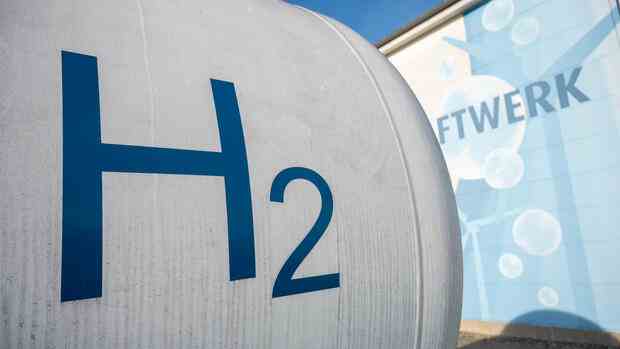Berlin The Greens parliamentary group in the Bundestag is backing the federal government in the dispute with France over the definition of green hydrogen. According to Felix Banaszak, member of the Greens in the Bundestag, hydrogen produced with nuclear power should not be classified as “green”. “The federal government should object to this regulation,” said the economic politician.
In a position paper available to the Handelsblatt, Banaszak advocates a narrow definition of green hydrogen. “The primary goal must be that green hydrogen is written on it where it is actually in it. Hydrogen from renewable electricity is the only sustainable and therefore green hydrogen,” it says. Banaszak thus expresses the majority opinion in the Greens parliamentary group.
This is increasing the pressure on the federal government to position itself in Brussels against the delegated legal act published by the EU Commission on Monday to define climate-friendly hydrogen. According to the Commission, hydrogen can also be considered climate-friendly if the electricity required to produce it comes from nuclear power plants.
In France, with its high proportion of nuclear power, the definition was well received. People around the French Energy Minister Agnès Pannier Runacher spoke of a “nice French victory”.
The Federal Ministry of Economics, which is responsible for the subject, sees things differently. “We have a clear position,” said a spokeswoman for the Ministry of Economic Affairs. “In our opinion, nuclear power is not renewable energy, and hydrogen produced with nuclear power is not renewable, green hydrogen.” Germany will contribute with this position.
However, the Federal Chancellery does not oppose the Commission’s proposals quite as vehemently as the Economics Department. “Basically, it is in the interest of all EU governments to get the hydrogen economy up and running, so that hydrogen is the gas of the future with which we all want to achieve our ambitious climate protection goals,” government spokesman Steffen Hebestreit said on Monday. That is why it is now important in the first step to “get the topic going”.
Blue hydrogen could help with bridging
The question of whether it is red, blue or green hydrogen is not that relevant at the moment. Rather, it is about “that we now achieve the momentum with regard to the hydrogen economy that we need in order to be able to switch to this form of energy carrier in the foreseeable future”.
There are signs of a dispute between France and Germany over the EU definition of green hydrogen.
(Photo: dpa)
Green politician Banaszak is calling for regulations that make it possible to clearly differentiate hydrogen produced from renewable electricity from hydrogen produced on the basis of nuclear power or natural gas. “I think it would be a joke if at the end of the day steel was considered green steel with additional fossil fuel use,” he said.
Blue hydrogen may “possibly be used as a bridge for a limited transition period, but this bridge must have a clear end”. This is produced on the basis of natural gas; the CO2 released during production is captured and stored underground.
Banaszak assumes that hydrogen will remain a scarce commodity in the long term. Therefore, its application must be clearly prioritized.
>> Read here: EU defines “green hydrogen” – starting signal for the economy
“Hydrogen should initially be used where the direct electrification of processes is not technically or economically an alternative,” says the position paper. That means priority for applications in the steel and chemical industries. Car traffic and residential real estate, on the other hand, do not represent a prioritized area of application because there are alternatives there.
Banaszak is critical of the state’s commitment to building a hydrogen infrastructure: “In order to plan and act in a needs-based manner, state coordination seems sensible to me. Whether a hydrogen network company with state participation is the most sensible way to do this is an open question.”
Federal Minister of Economics Robert Habeck (Greens) is pursuing the goal of establishing a state hydrogen network company. However, this plan has met with skepticism not only from within his own ranks, but also from his coalition partners.
SPD and FDP criticize plans for hydrogen network society
The SPD fears that a state hydrogen infrastructure company could design a pipeline network that only takes Germany’s industrial centers into account. Steel, chemical and cement companies could then be supplied with hydrogen, but other potential customers, such as in the transport and heat sectors, were not taken into account.
>> Read here: After the skepticism comes the boom: This is how the USA wants to conquer the hydrogen market
“A federal hydrogen infrastructure company must not deviate from the understanding of decentralized possible hydrogen requirements. That would be the case if it were limited to just a few axes that would route the hydrogen to a few consumption centers,” Nina Scheer, spokeswoman for energy policy for the SPD parliamentary group, told the Handelsblatt. One should not slam the door on using hydrogen in the heating and transport sectors.
The FDP parliamentary group is fundamentally skeptical about state participation. The liberals also see the same danger as the SPD: “A hydrogen network under state control harbors the risk of being built purely according to political wishes,” said FDP parliamentary group leader Lukas Köhler.
More: Nationalized gas company Sefe wants to build state hydrogen network.
